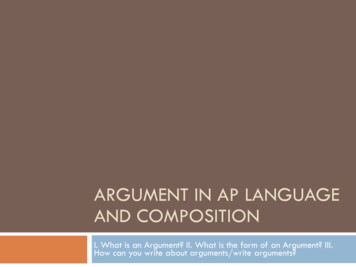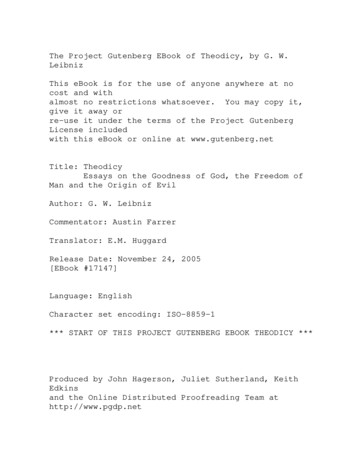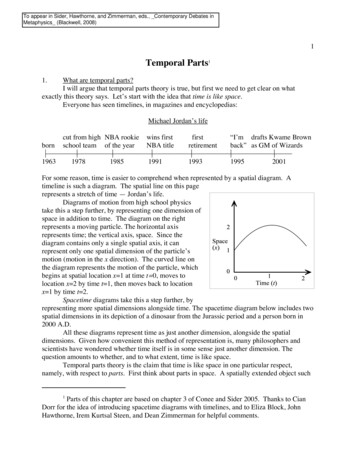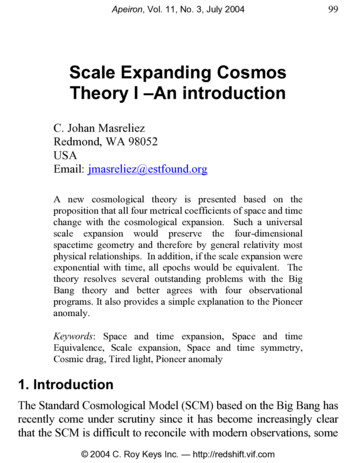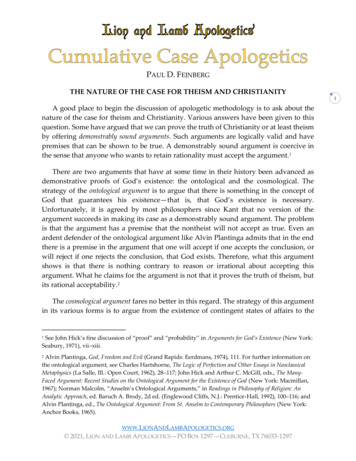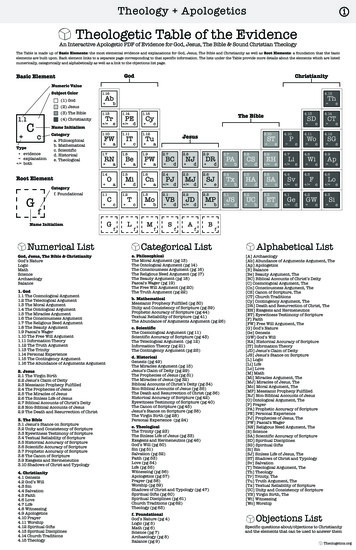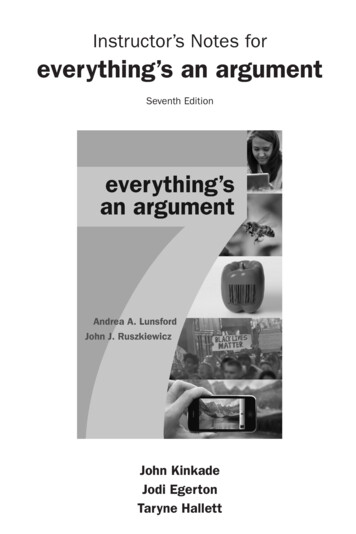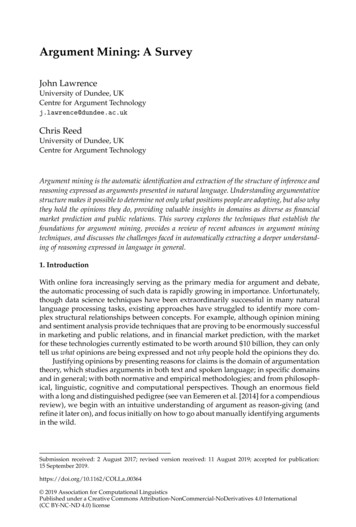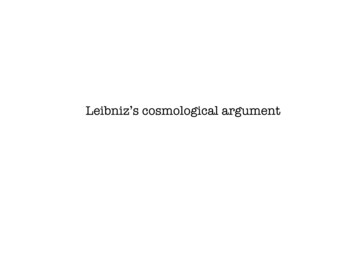
Transcription
Leibniz’s cosmological argument
So far we have discussed two of Aquinas’ arguments for the existence of God. These are each versions ofthe cosmological argument - so called because they are attempts to argue from the existence of thecosmos - the universe - to the existence of God.The aspects of the cosmos on which those two arguments focused were different. Aquinas’ second wayfocused on the fact that the cosmos contained beings which have been caused to exist, while his thirdway focused on the fact that the cosmos contains contingent beings - beings who could have failed toexist.Our topic today is an attempt by a later philosopher, GottfriedLeibniz, to improve on Aquinas’ third way.Leibniz was a German philosopher, mathematician, theologian, andscientist, whose achievements included the invention of calculus.Indeed, his intellect and achievements were such that they ledDiderot, a later French philosopher, to remark that“When one compares the talents one has with those of aLeibniz, one is tempted to throw away one's books and godie quietly in the dark of some forgotten corner.”As we’ll see, Leibniz agreed with Aquinas that reflection on thenature of necessity and possibility was enough to show theexistence of God; and, moreover, Leibniz managed to find a line ofreasoning for this conclusion which avoids the two main problemswe discussed with Aquinas’ argument.
1. The principle ofsufficient reason2. The argument3. Objections3.1 Explaining God3.2 Quantum mechanics3.3 CollapseLeibniz’s argument is best thought of as beginning with a question which heposes at the end of the first paragraph of our reading for today:Why is there any world at all, and why is it the way that it is?Leibniz’s core thoughts are: (1) that this question must have an answer, and (2)that the only satisfactory answer to this question will imply the existence ofGod.Leibniz thought that there must be some explanation of why there is a world at all because he endorsed a certainprinciple about explanation, known as the principle of sufficient reason.The basic idea behind the principle is this:Take any feature of the world. If the world could have failed to be that way, then there must be someexplanation of why the world is that way.So, for example, we might notice that although the sky is blue, it might not have been - the sky on earth couldhave failed to be blue. Given only this, Leibniz concludes that there must be some reason, or explanation, why thesky is blue: some reason why it is blue rather than some other color.This sort of example suggests the following version of the principle of sufficient reason:Principle of sufficient reasonAny contingent fact about the world must have an explanation.Does this principle seem plausible to you? Can you think of any arguments for it?
1. The principle ofsufficient reason2. The argument3. Objections3.1 Explaining God3.2 Quantum mechanics3.3 CollapsePrinciple of sufficient reasonAny contingent fact about the world must have an explanation.Our next task is to understand how Leibniz usesthe principle of sufficient reason to argue for theexistence of God.His key premise seems to be that if nothingexisted besides the sorts of things we find in theworld, there would be no explanation of why thesethings exist.
1. The principle ofsufficient reason2. The argument3. Objections3.1 Explaining God3.2 Quantum mechanics3.3 CollapsePrinciple of sufficient reasonAny contingent fact about the world must have an explanation.Our next task is to understand how Leibniz usesthe principle of sufficient reason to argue for theexistence of God.His key premise seems to be that if nothingexisted besides the sorts of things we find in theworld, there would be no explanation of why thesethings exist.He illustrates this point by his example of thegeometry books.
1. The principle ofsufficient reason2. The argument3. Objections3.1 Explaining God3.2 Quantum mechanics3.3 CollapsePrinciple of sufficient reasonAny contingent fact about the world must have an explanation.Our next task is to understand how Leibniz usesthe principle of sufficient reason to argue for theexistence of God.His key premise seems to be that if nothingexisted besides the sorts of things we find in theworld, there would be no explanation of why thesethings exist.He illustrates this point by his example of thegeometry books.Leibniz thinks that, even we can explain theexistence of each of the geometry books by theone from which it was copied, we can’t explainwhy these books exist at all.And what goes for the geometry books, Leibnizthinks, goes for the world as a whole. Even if wecan explain one state of the world in terms of thepreceding state of the world, we lack anexplanation of the fact that there is a world at all.
1. The principle ofsufficient reason2. The argument3. Objections3.1 Explaining God3.2 Quantum mechanics3.3 CollapsePrinciple of sufficient reasonAny contingent fact about the world must have an explanation.Again, it seems that two main points emerge fromLeibniz’s discussion here.First, that the existence of “the individual things,or . the entire collection and series of things”needs some explanation.Second, that we cannot find such an explanationin the “entire collection and series of things.”But what does Leibniz have in mind when he is talkingabout “the individual things”? Which things?
Principle of sufficient reason1. The principle ofsufficient reason2. The argument3. Objections3.1 Explaining God3.2 Quantum mechanics3.3 CollapseAny contingent fact about the world must have an explanation.A passage later in the reading suggests an answer.Again, it seems that two main points emerge fromLeibniz’s discussion here.First, that the existence of “the individual things,or . the entire collection and series of things”needs some explanation.Second, that we cannot find such an explanationin the “entire collection and series of things.”But what does Leibniz have in mind when he is talkingabout “the individual things”? Which things?Here Leibniz contrasts two kinds of necessity:physical or hypothetical necessity and absolute ormetaphysical necessityPhysical necessity is what is necessary, given the way thelaws of nature happen to be. Metaphysical, or absolute,necessity is what is necessary without qualification. Since thelaws of nature could have been different than they are,something can be physically necessary without beingabsolutely or metaphysically necessary. Can you think of anexample?The point Leibniz emphasizes in this passage is that theexistence of things in the world is not metaphysicallynecessary.
Principle of sufficient reason1. The principle ofsufficient reason2. The argument3. Objections3.1 Explaining God3.2 Quantum mechanics3.3 CollapseAny contingent fact about the world must have an explanation.A passage later in the reading suggests an answer.Again, it seems that two main points emerge fromLeibniz’s discussion here.First, that the existence of “the individual things,or . the entire collection and series of things”needs some explanation.Second, that we cannot find such an explanationin the “entire collection and series of things.”But what does Leibniz have in mind when he is talkingabout “the individual things”? Which things?The point Leibniz emphasizes in this passage is that theexistence of things in the world is not metaphysicallynecessary.And this, in turn, suggests an answer to ourquestion. When Leibniz says that “the entirecollection and series of things” needs someexplanation, he is talking about the entire seriesand collection of things whose existence is notmetaphysically necessary - i.e., the collection ofthings which exist only contingently.
Principle of sufficient reason1. The principle ofsufficient reason2. The argument3. Objections3.1 Explaining God3.2 Quantum mechanics3.3 CollapseAny contingent fact about the world must have an explanation.This enables us to reformulate Leibniz’s two central pointsa little more clearly. The first can be stated as:Again, it seems that two main points emerge fromLeibniz’s discussion here.First, that the existence of “the individual things,or . the entire collection and series of things”needs some explanation.Second, that we cannot find such an explanationin the “entire collection and series of things.”But what does Leibniz have in mind when he is talkingabout “the individual things”? Which things?And this, in turn, suggests an answer to ourquestion. When Leibniz says that “the entirecollection and series of things” needs someexplanation, he is talking about the entire seriesand collection of things whose existence is notmetaphysically necessary - i.e., the collection ofthings which exist only contingently.The fact that there are contingent things musthave an explanation.The second can be stated as:The fact that there are contingent things can’t beexplained by any contingent things.
Principle of sufficient reason1. The principle ofsufficient reason2. The argument3. Objections3.1 Explaining God3.2 Quantum mechanics3.3 CollapseAny contingent fact about the world must have an explanation.The fact that there are contingent things musthave an explanation.Why does Leibniz think that these claims are true? Let’sbegin with the first.A natural thought is that this is supposed to follow fromthe principle of sufficient reason, since both are claimsabout what sorts of things must have an explanation. Whatassumption would be required to get from the principle ofsufficient reason to the claim that the fact that there arecontingent things must have an explanation?It is a contingent fact that there are contingent things.We’ll return to the question of whether this assumption istrue. But for now, let’s see how these premises might beused to get to Leibniz’s intended conclusion:The fact that there are contingent things can’t beexplained by any contingent things.
Principle of sufficient reason1. The principle ofsufficient reason2. The argument3. Objections3.1 Explaining God3.2 Quantum mechanics3.3 CollapseAny contingent fact about the world must have an explanation.It is a contingent fact that there are contingentthings.The fact that there are contingent things musthave an explanation.The fact that there are contingent things can’t beexplained by any contingent things.We’ll return to the question of whether this assumption istrue. But for now, let’s see how these premises might beused to get to Leibniz’s intended conclusion:Or, in other words,There is a necessary being.
Principle of sufficient reason1. The principle ofsufficient reason2. The argument3. Objections3.1 Explaining God3.2 Quantum mechanics3.3 CollapseAny contingent fact about the world must have an explanation.It is a contingent fact that there are contingentthings.The fact that there are contingent things musthave an explanation.The fact that there are contingent things can’t beexplained by any contingent things.From the fact that the existence of contingentthings needs an explanation, plus the fact thatthis explanation cannot be provided by anycontingent things, it follows that:And this implies that there must be somethingwhose existence is not contingent, which is ourconclusion.The fact that there are contingent things must beexplained by something whose existence is notcontingent.There is a necessary being.
1. The principle ofsufficient reason2. The argument3. Objections3.1 Explaining God3.2 Quantum mechanics3.3 CollapseLeibniz’s cosmological argument1. Any contingent fact about the world must have anexplanation. (Principle of sufficient reason)2. It is a contingent fact that there are contingentthings.3. The fact that there are contingent things musthave an explanation. (1,2)4. The fact that there are contingent things can’t beexplained by any contingent things.5. The fact that there are contingent things must beexplained by something whose existence is notcontingent. (3,4)C. There is a necessary being. (5)Is this argument valid?It appears so. So let’s turn to the question of whether the premises of theargument are true.
Leibniz’s cosmological argument1. The principle ofsufficient reason2. The argument3. Objections3.1 Explaining God3.2 Quantum mechanics3.3 Collapse1. Any contingent fact about the world must havean explanation. (Principle of sufficient reason)2. It is a contingent fact that there arecontingent things.3. The fact that there are contingent things musthave an explanation. (1,2)4. The fact that there are contingent things can’tbe explained by any contingent things.Is this argument valid?5. The fact that there are contingent things must beexplained by something whose existence is notcontingent. (3,4)C. There is a necessary being. (5)It appears so. So let’s turn to the question of whether the premises of the argument are true.The argument contains only three independent premises: 1, 2, and 4. We have already discussed 1, the principle ofsufficient reason.Let’s think about premise 2. Why would Leibniz think that this is true? Perhaps because of an argument like thefollowing one:If something is contingent, that means that it could have failed to exist. So every individualthing in the collection of contingent things could have failed to exist. So, the whole collectionof contingent things could have failed to exist, in which case there would have been nocontingent things at all. Hence the existence of contingent things is itself contingent.Is this a good argument?
Leibniz’s cosmological argument1. The principle ofsufficient reason2. The argument3. Objections3.1 Explaining God3.2 Quantum mechanics3.3 Collapse1. Any contingent fact about the world must havean explanation. (Principle of sufficient reason)2. It is a contingent fact that there arecontingent things.3. The fact that there are contingent things musthave an explanation. (1,2)4. The fact that there are contingent things can’tbe explained by any contingent things.5. The fact that there are contingent things must beexplained by something whose existence is notcontingent. (3,4)C. There is a necessary being. (5)Let’s think about premise 2. Why would Leibniz think that this is true? Perhaps because of an argument like thefollowing one:If something is contingent, that means that it could have failed to exist. So every individualthing in the collection of contingent things could have failed to exist. So, the whole collectionof contingent things could have failed to exist, in which case there would have been nocontingent things at all. Hence the existence of contingent things is itself contingent.Is this a good argument?There’s a problem here, which is a version of the problem we raised for Aquinas’ third way: the problem is that it doesnot seem to follow from the fact that every member of a collection is a certain way that the collection as a whole is thatway. Why not think that every contingent thing could have failed to exist, but that it is a necessary truth that somecontingent things exist? In that case, premie 2 would be false and Leibniz’s argument would fail.
Leibniz’s cosmological argument1. The principle ofsufficient reason2. The argument3. Objections3.1 Explaining God3.2 Quantum mechanics3.3 Collapse1. Any contingent fact about the world must havean explanation. (Principle of sufficient reason)2. It is a contingent fact that there arecontingent things.3. The fact that there are contingent things musthave an explanation. (1,2)4. The fact that there are contingent things can’tbe explained by any contingent things.5. The fact that there are contingent things must beexplained by something whose existence is notcontingent. (3,4)C. There is a necessary being. (5)There’s a problem here, which is a version of the problem we raised for Aquinas’ third way: the problem is that it doesnot seem to follow from the fact that every member of a collection is a certain way that the collection as a whole is thatway. Why not think that every contingent thing could have failed to exist, but that it is a necessary truth that somecontingent things exist? In that case, premie 2 would be false and Leibniz’s argument would fail.Can you think of another way to argue for premise 2?
Leibniz’s cosmological argument1. Any contingent fact about the world must havean explanation. (Principle of sufficient reason)2. It is a contingent fact that there arecontingent things.1. The principle ofsufficient reason2. The argument3. Objections3.1 Explaining God3.2 Quantum mechanics3.3 Collapse3. The fact that there are contingent things musthave an explanation. (1,2)4. The fact that there are contingent things can’tbe explained by any contingent things.5. The fact that there are contingent things must beexplained by something whose existence is notcontingent. (3,4)C. There is a necessary being. (5)Let’s turn then to our last independent premise, premise 4.Suppose that the world has existed for an infinite time, and that each contingent thing was caused to exist, andhence explained, by some prior contingent thing. Would this show that premise (4) is false?Does Leibniz need a “no infinite chains” premise of the sort employed by Aquinas in his 2nd way? Does Leibnizthink that we can know just by thinking about it that the universe has been around for a finite time, and so musthave had a first cause?Can you think of any reason for thinking that premise 4 is true?
Leibniz’s cosmological argument1. The principle ofsufficient reason2. The argument3. Objections3.1 Explaining God3.2 Quantum mechanics3.3 Collapse1. Any contingent fact about the world must havean explanation. (Principle of sufficient reason)2. It is a contingent fact that there arecontingent things.3. The fact that there are contingent things musthave an explanation. (1,2)4. The fact that there are contingent things can’tbe explained by any contingent things.5. The fact that there are contingent things must beexplained by something whose existence is notcontingent. (3,4)C. There is a necessary being. (5)So it seems that Leibniz’s argument is valid, and that we can give pretty plausible defenses of each of the independentpremises. So his argument is looking pretty good.But one might worry that this argument is open to a objection we raised for Aquinas’ second way (remember ourdiscussion of the big bang theory of the origins of the universe): even if Leibniz succeeds in showing that there is anecessary being, would this really suffice to show that God exists? What would Leibniz say in response to thischallenge?Let’s turn, then, to some objections to the premises of Leibniz’s argument.
Leibniz’s cosmological argument1. The principle ofsufficient reason2. The argument3. Objections3.1 Explaining God3.2 Quantum mechanics3.3 Collapse1. Any contingent fact about the world must havean explanation. (Principle of sufficient reason)2. It is a contingent fact that there arecontingent things.3. The fact that there are contingent things musthave an explanation. (1,2)4. The fact that there are contingent things can’tbe explained by any contingent things.Let’s turn, then, to some objections to thepremises of Leibniz’s argument.5. The fact that there are contingent things must beexplained by something whose existence is notcontingent. (3,4)C. There is a necessary being. (5)The first might be expressed in an intuitive way like this:Leibniz demands that everything get an explanation - at least that is what the first premisesays. But then why is the existence of God the one thing that does not need anexplanation? Surely if the existence of contingent things needs some explanation, then sodoes the existence of God - but no religious believer can accept the idea that the existenceof God would be explained by something else!There is an obvious response to this objection: Leibniz does not say that everything needs an explanation, but only thatall contingent things need an explanation. So the principle of sufficient reason does not imply that God needs anexplanation, since God is a necessary being.Is this a satisfying reply to the objection?
1. The principle ofsufficient reason2. The argument3. Objections3.1 Explaining God3.2 Quantum mechanics3.3 CollapseLeibniz’s cosmological argument1. Any contingent fact about the world must have an explanation. (Principle of sufficient reason)2. It is a contingent fact that there are contingent things.3. The fact that there are contingent things must have an explanation. (1,2)4. The fact that there are contingent things can’t be explained by any contingent things.5. The fact that there are contingent things must be explained by something whose existenceis not contingent. (3,4)C. There is a necessary being. (5)A second objection is an objection to premise 1, the principle of sufficient reason, and is based on certaininterpretations of quantum mechanics, our best current theory of the physical world.According to the standard interpretations of quantum mechanics - though not all interpretations of the theory - thephysical world is indeterministic. That is, what the laws of nature tell us in many cases is not what will happen, butrather than probabilities of various outcomes each of which is consistent with the laws of nature.Let’s imagine a case in which there are three such possible outcomes, A, B, and C, and that quantum mechanics tellsus that A has a 40% chance of happening, B has a 25% chance of happening, and C has a 35% chance ofhappening. Now suppose C is what in fact happens, and we ask this question:Why did C, rather than A or B, happen?Many people think that quantum mechanics strongly suggests that there is no answer to this question: there simplyis no reason why C, rather than A or B, happened.If this were true, would this pose a problem for the PSR? Could the principle be modified to avoid this sort ofcounterexample?
1. The principle ofsufficient reason2. The argument3. Objections3.1 Explaining God3.2 Quantum mechanics3.3 CollapseLeibniz’s cosmological argument1. Any contingent fact about the world must have an explanation. (Principle of sufficient reason)2. It is a contingent fact that there are contingent things.3. The fact that there are contingent things must have an explanation. (1,2)4. The fact that there are contingent things can’t be explained by any contingent things.5. The fact that there are contingent things must be explained by something whose existenceis not contingent. (3,4)C. There is a necessary being. (5)A final objection is, in a way, the most worrying. We are supposing that it is contingent that there are anycontingent things, and hence that by the principle of sufficient reason, there must be some explanation forthe fact that there are contingent things.Let us suppose that the fact that there are contingent beings is explained by some necessary being,whom we can call N. Then it seems as though if the cosmological argument is to be convincing, thefollowing must be true:N creates contingent things.So far, so good, you might think. On closer examination, though, this claim leads to a dilemma.
1. The principle ofsufficient reason2. The argument3. Objections3.1 Explaining God3.2 Quantum mechanics3.3 CollapseLeibniz’s cosmological argument1. Any contingent fact about the world must have an explanation. (Principle of sufficient reason)2. It is a contingent fact that there are contingent things.3. The fact that there are contingent things must have an explanation. (1,2)4. The fact that there are contingent things can’t be explained by any contingent things.5. The fact that there are contingent things must be explained by something whose existenceis not contingent. (3,4)C. There is a necessary being. (5)So far, so good, you might think. On closer examination, though, this claim leads to a dilemma.If we are supposing that this claim is true, then it must be either a necessary truth or a contingent truth.N creates contingent things.contingentnecessary
1. The principle ofsufficient reason2. The argument3. Objections3.1 Explaining God3.2 Quantum mechanics3.3 CollapseLeibniz’s cosmological argument1. Any contingent fact about the world must have an explanation. (Principle of sufficient reason)2. It is a contingent fact that there are contingent things.3. The fact that there are contingent things must have an explanation. (1,2)4. The fact that there are contingent things can’t be explained by any contingent things.5. The fact that there are contingent things must be explained by something whose existenceis not contingent. (3,4)C. There is a necessary being. (5)Let’s explore the first horn of thedilemma first: suppose that the claimthat N explains the existence ofcontingent things is itself contingent.N creates contingent things.contingentnecessary
1. The principle ofsufficient reason2. The argument3. Objections3.1 Explaining God3.2 Quantum mechanics3.3 CollapseLeibniz’s cosmological argument1. Any contingent fact about the world must have an explanation. (Principle of sufficient reason)2. It is a contingent fact that there are contingent things.3. The fact that there are contingent things must have an explanation. (1,2)4. The fact that there are contingent things can’t be explained by any contingent things.5. The fact that there are contingent things must be explained by something whose existenceis not contingent. (3,4)C. There is a necessary being. (5)Let’s explore the first horn of thedilemma first: suppose that the claimthat N explains the existence ofcontingent things is itself contingent.N creates contingent things.contingentThen by the PSR there must besome explanation for the factthat N explains the existence ofcontingent things.necessaryIf this is true, then it follows from theprinciple of sufficient reason that theremust be some explanation for this.
1. The principle ofsufficient reason2. The argument3. Objections3.1 Explaining God3.2 Quantum mechanics3.3 CollapseLeibniz’s cosmological argument1. Any contingent fact about the world must have an explanation. (Principle of sufficient reason)2. It is a contingent fact that there are contingent things.3. The fact that there are contingent things must have an explanation. (1,2)4. The fact that there are contingent things can’t be explained by any contingent things.5. The fact that there are contingent things must be explained by something whose existenceis not contingent. (3,4)C. There is a necessary being. (5)Let’s explore the first horn of thedilemma first: suppose that the claimthat N explains the existence ofcontingent things is itself contingent.N creates contingent things.contingentThen by the PSR there must besome explanation for the factthat N explains the existence ofcontingent things.But there is no suchexplanation.necessaryIf this is true, then it follows from theprinciple of sufficient reason that theremust be some explanation for this.But this sounds absurd. What couldexplain this? N itself can’t explain thefact that N explains the existence ofcontingent things, since this is circular.And what else could explain this?
1. The principle ofsufficient reason2. The argument3. Objections3.1 Explaining God3.2 Quantum mechanics3.3 CollapseLeibniz’s cosmological argument1. Any contingent fact about the world must have an explanation. (Principle of sufficient reason)2. It is a contingent fact that there are contingent things.3. The fact that there are contingent things must have an explanation. (1,2)4. The fact that there are contingent things can’t be explained by any contingent things.5. The fact that there are contingent things must be explained by something whose existenceis not contingent. (3,4)C. There is a necessary being. (5)So let’s turn to the other horn of thedilemma, and suppose that this claimabout N is necessary.N creates contingent things.contingentThen by the PSR there must besome explanation for the factthat N explains the existence ofcontingent things.But there is no suchexplanation.necessaryThen we avoid having to find anexplanation for this claim, which isgood.
1. The principle ofsufficient reason2. The argument3. Objections3.1 Explaining God3.2 Quantum mechanics3.3 CollapseLeibniz’s cosmological argument1. Any contingent fact about the world must have an explanation. (Principle of sufficient reason)2. It is a contingent fact that there are contingent things.3. The fact that there are contingent things must have an explanation. (1,2)4. The fact that there are contingent things can’t be explained by any contingent things.5. The fact that there are contingent things must be explained by something whose existenceis not contingent. (3,4)C. There is a necessary being. (5)So let’s turn to the other horn of thedilemma, and suppose that this claimabout N is necessary.N creates contingent things.contingentThen by the PSR there must besome explanation for the factthat N explains the existence ofcontingent things.But there is no suchexplanation.necessaryIt is a necessary truththat there arecontingent things.Then we avoid having to find anexplanation for this claim, which isgood.But we end up with a worse problem: ifit is a necessary truth that N explainsthe existence of contingent things, thenit is a necessary truth that there arecontingent things.
1. The principle ofsufficient reason2. The argument3. Objections3.1 Explaining God3.2 Quantum mechanics3.3 CollapseLeibniz’s cosmological argument1. Any contingent fact about the world must have an explanation. (Principle of sufficient reason)2. It is a contingent fact that there are contingent things.3. The fact that there are contingent things must have an explanation. (1,2)4. The fact that there are contingent things can’t be explained by any contingent things.5. The fact that there are contingent things must be explained by something whose existenceis not contingent. (3,4)C. There is a necessary being. (5)So let’s turn to the other horn of thedilemma, and suppose that this claimabout N is necessary.N creates contingent things.contingentThen by the PSR there must besome explanation for the factthat N expla
sufficient reason 2. The argument 3. Objections 3.1 Explaining God 3.2 Quantum mechanics 3.3 Collapse Our next task is to understand how Leibniz uses the principle of sufficient reason to argue for the existence of God. Principle of sufficient reason Any contingent fact about the world
